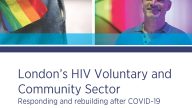London’s HIV sector needs support after the pandemic
The DSC research team has gathered new data on London's HIV sector. Here's our Senior Researcher, Chester Howarth, explaining what they've found.
DSC recently gathered brand new data, in partnership with Fast-Track Cities London, as part of a research project with voluntary and community organisations that support people affected by HIV.
What does the HIV voluntary and community sector do?
Around half of Britons still remember the awareness-raising campaigns of the 1980s, which focused on the risk to life that HIV posed at that time. People also tend to think of HIV as a serious health condition – and younger people are more likely than older people to see HIV through a medical lens.
Today, with appropriate treatment, people with HIV can expect to live about as long as the population more broadly. In fact, we are now seeing the first generation of people living into older age with HIV because of improvements in medicines and treatments and a more holistic approach to support involving physical, mental, emotional and social well-being.
This holistic approach is reflected in the HIV voluntary and community sector organisations’ wide-ranging work with people affected by HIV. Among many other things, the support provided by some of these voluntary and community sector (VCS) organisations we came across in this research included outreach and education work in communities to assist in prevention, specialist counselling services and spaces for people with living with HIV to connect.
How did London’s HIV voluntary and community sector fare during the COVID-19 pandemic?
On the one hand, our research showed increased demand for support. Most of the VCS organisations that participated said that demand was higher than it was prior to the COVID-19 pandemic – on average, around 25% higher. Of course, this is an average, and some VCS organisations experienced even greater rising demand, while others experienced smaller increases.
On the other hand, VCS organisations had overwhelmingly seen their expenditure increase relative to three years ago, for example due to increased costs of service delivery like staffing and energy costs. Yet, the vast majority of those facing higher costs had actually seen their income decrease.
Against this backdrop, VCS organisations were typically meeting demand. However, this was typically with resources stretched to their maximum. Across four important areas of support, including mental health and financial support, the research showed that VCS organisations tended to be meeting demand but with no spare capacity.
How resilient is London’s HIV voluntary and community sector?
Like many VCS organisations working in other areas, simply continuing to provide support for the people who need it demonstrates resilience, an ability to withstand the challenges of recent years – from the COVID-19 pandemic to the cost-of-living crisis.
One of the ways VCS organisations have been resilient during these challenging times has been making use of their reserves. We found a clear majority of VCS organisations in our research had used reserves to meet their operating costs, including all of those who had faced increased expenditure alongside decreased demand. This is, of course, part of why reserves are important – but is not sustainable if the financial situation does not improve.
What lies ahead?
While twice as many VCS organisations said their financial security had significantly worsened than had significantly improved compared to before the pandemic, there was a net balance of hope for the future. Close to half of the organisations who participated in this research thought their financial security would improve in the coming year.
Nevertheless, there may be challenges ahead. Within the next year, more than three in ten VCS organisations who responded expected to see a reduction in paid staff – and a similar proportion thought staff burnout would become a reality during this time. Meanwhile, around two in ten expected a reduction in or burnout among volunteers to materialise within the next year.
Despite most of the organisations we surveyed saying they already had, or were expecting have, significantly increased demand and need for support, around three in ten expected a reduction in service delivery to become a reality in the next year. Even more concerningly, a similar proportion thought their organisation might close permanently within a year.
How can we ensure support continues?
London’s HIV charities provide support that is widely utilised and seen as important by those who access it. To ensure this support is available and reaches everyone who needs it, DSC made recommendations for the future. These include fostering better understanding of which VCS organisations provide support in London and encouraging greater collaboration among them and with statutory providers, ensuring that sustainable funding is in place, and recruiting and retaining staff and volunteers.
The full report, which also includes insights on the changing needs of people affected by HIV in London, is free to download here.


